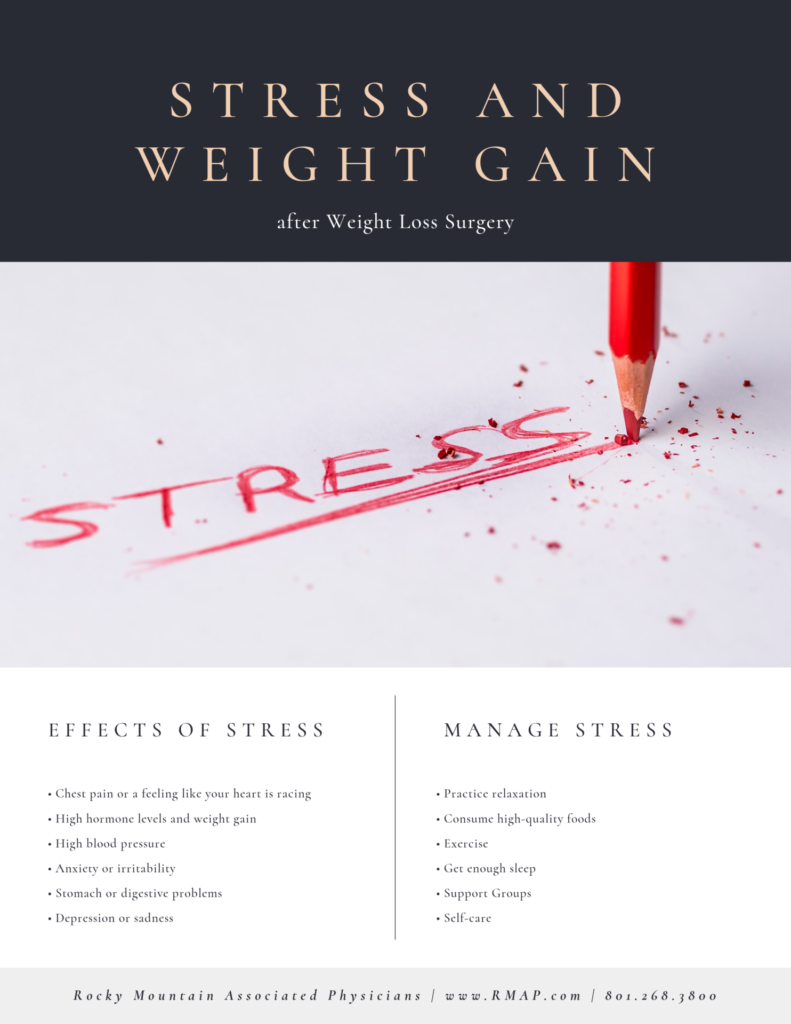
Learn more about weight loss surgery at Rocky Mountain Associated Physicians www.RMAP.com (801) 268-3800
Stress brought on by challenges or demands that lead you to feel worried, frustrated, anxious, or upset can cause the body to react in a negative way. Not only can stress affect your physical health, it can impact your emotional and psychological health as well.
You could be familiar with the terms “emotional eating,” “stress eating,” “head hunger,” or “emotional hunger.” Any of these terms can affect your weight loss. When people stress-eat, they often keep eating even though they are no longer hungry. It could be hard not to mindlessly eat, not paying attention to how much or what they eat.
Eating in response to unpleasant or uncomfortable emotions most often means turning to “comfort” foods, such as ice cream, chocolate, cookies, cakes, potato chips, and fried foods to name a few. When people are in emotional turmoil, hardly are salads, veggies, or a type of protein-packed snack reached for. When foods are high in calories and low in nutrition, it is a recipe for some type of weight gain.
It’s no secret that life is stressful. How often have you found yourself saying, “life just happened,” or “I’m dealing with a lot of stress right now.” If you turn to food to make yourself feel better, feel like food makes you feel safe, or a quick fix to heartache or loneliness, these are indications that it could be from an emotional-eating standpoint and not actual physical hunger.
The bottom line is that stress can lead to the release of hormones such as cortisol, which stimulates your fat and carbohydrate metabolism, creating a surge of energy in your body, increasing your appetite. Elevated cortisol levels can cause cravings for sweet, fatty, and salty foods.1
Ways to Help Manage Stress
Identifying how you feel, recognizing what you need, and choosing what to do instead of grabbing for unhealthy food options is an imperative habit to form to help avoid stress-eating. You could be thinking that’s easier said than done, but with committed effort and resilient determination, you can develop this new habit over time and keep up with your weight loss, too!
- Practice Relaxation: This can be done through mindfulness meditation, yoga, or deep breathing. These options can help bring hormones down to normal levels.
- Consume High-Quality Foods: Even though you might be having cravings or want a “quick fix,” try to aim for whole, plant-based foods. These foods will be turned into energy instead of being converted into fat and stored by the body.
- Exercise: Getting out for a daily walk, run, or getting into the gym is an excellent way to manage stress hormones. Any type of movement, such as dancing, swimming, sports, hiking, etc. is considered exercising. So, make it fun and enjoyable to do!
- Getting Enough Sleep: Following a regular sleep routine calms and restores the body. Sleep also decreases cortisol levels, which if you remember, cortisol is accountable for your fight or flight reaction to danger, increasing your heart rate in anticipation of a fight. Is has been studied that getting less than five hours of sleep a night has been linked to cortisol-related issues, such as high blood pressure.2 Try to get at least 7-9 hours of sleep each night to avoid the rise in hormone levels.
- Support Groups: Participating in groups provide an excellent opportunity to be surrounded by others who likely know and understand similar situations you could be experiencing. It is a judge-free zone where you can talk openly and honestly. You can express your feelings while getting feedback from fellow patients who can share their experience, and can give helpful tips which could work for you too. Rocky Mountain Associated Physicians (RMAP) believes it very beneficial to our patients to provide group therapy for all patients who wish to be supported in this way.
For more information on our support groups and how to join them, please visit here.
It is imperative to take care of yourself and prioritize yourself, which means taking the time to do things that help you live well and improve both your physical and mental health. These are just a few examples to help you begin implementing healthy habits into your daily life.
Don’t forget the most important thing during your life time…which is YOU!
Links to related articles:
Weight Regain: Living with Fear and Dread
Preparing Emotionally for Weight Loss Surgery
Overeating Triggers and Tips
Food Addictions and Habits
www.RMAP.com
Rocky Mountain Associated Physicians
801-268-3800
1160 East 3900 South, Suite 4100
SLC, UT 84124
Resources
- William Shaw, PhD; Susan Labott-Smith, PhD, ABPP; Matthew M. Burg, PhD; Camelia Hostinar, PhD; Nicholas Alen, BA; Miranda A.L. van Tilburg, PhD; Gary G. Berntson, Phd; Steven M. Tovian, PhD, ABPP, FAClinP, FAClinHP; and Malina Spirito, PsyD, Med, “Stress effects on the body”, American Psychological Association; 2018 Nov 1, https://www.apa.org/topics/stress/body
- Leproult, G. Copinschi, O. Buxton, E Van Cauter, “Sleep loss results in an elevation of cortisol levels the next evening”, 1997 Oct; 20(10):865-70, https://pubmed.ncbi.nlm.nih.gov/9415946













 Address: 1521 East 3900 South STE 100
Address: 1521 East 3900 South STE 100 Office: +
Office: +  Fax number (801) 268-3997
Fax number (801) 268-3997 Email: info@rmapinc.com
Email: info@rmapinc.com



